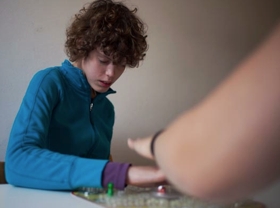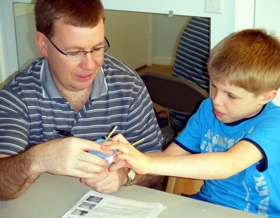Recommended Daily Hours
for a Home Program
 Parents who are working with their child in a full-time home program often receive conflicting advice about how many hours per day are necessary to help their child make optimal progress.
Parents who are working with their child in a full-time home program often receive conflicting advice about how many hours per day are necessary to help their child make optimal progress.
In some cases, parents are advised to provide a very intense daily schedule of 10-12 hours of structured program per day. Given the considerable demands that long program hours place on families, ethical practice requires professionals to design programs that can provide the optimum benefits without imposing unnecessary demands for time, effort and expense on the family.
We do not advocate a 10-12 hour a per day program, because research indicates that this is not necessary. Although there are conflicting opinions about the optimal number of hours per day for home programs, there is general agreement among researchers that children receive diminishing benefits from home programs after six hours per day.
In other words, research indicates that children are not likely to make significantly more progress in programs lasting 8, 10 or 12 hours per day than they will make in programs of 6 hours per day.
The Growing Minds Approach
- The program must be tailored to fit the child and family, rather than trying to fit the child or family to the program.
- Working longer daily hours does not necessarily produce faster improvement.
- This is especially true when the goals and teaching methods are appropriately targeted to meet the child’s needs.
- Decisions about teaching methods, goals, play/therapy room, program hours and school attendance must be made on an individual basis.
- We look for ways to work smarter, rather than working harder.
How We Arrive at Recommended
Program Hours and Structure
 After evaluating a child and setting appropriate developmental targets, we suggest an optimum schedule for that child. We encourage parents to implement this on a trial basis with evaluation of the child’s progress.
After evaluating a child and setting appropriate developmental targets, we suggest an optimum schedule for that child. We encourage parents to implement this on a trial basis with evaluation of the child’s progress.
After trial periods of as little as four weeks, we can confirm the optimum length of the program for that child. We base our recommendation upon actual evidence of the individual child’s progress, rather than on theories, intuitions or what has been observed with others.
We train parents to maximize opportunities for incidental learning. This enables parents to become more effective at using the natural setting, including interactions with family and friends as well as daily activities such as meals, play times, car rides, bathing, outings, etc., to help children achieve the established developmental targets. When this aspect of the program is effective, the hours of formal training and instruction can often be reduced without sacrificing progress.
In many instances, if a child is affectionate, in good contact with parents, has a number of emerging skills and access to a fairly good school program, we find that 2.5 to 3 hours of a focused home program, 5 days a week, enables the child to make maximum progress.
If the child is at home in a full-time program with no school attendance, a schedule of 5-6 hours per day is more likely to be appropriate.
Some children don’t require a formal home program and some families can’t provide one. We consider the needs of the child and family as well as the resources in the local community in order to recommend a program structure that will meet the child’s needs while also being sustainable.
Working longer daily hours does not necessarily produce faster improvement. This is especially true when the goals and teaching methods are appropriately targeted to meet the child’s needs.
We look for ways to work smarter, rather than working harder.
Copyright © 2012 Steven R. Wertz